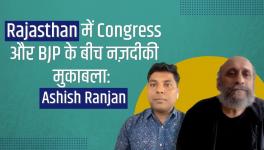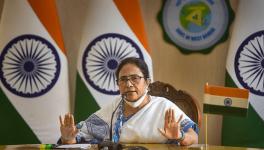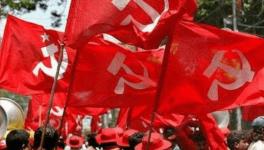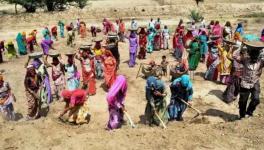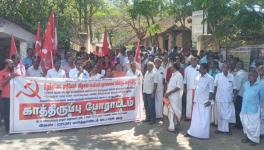The Elderly Protest in Delhi, Demand Universal Pension
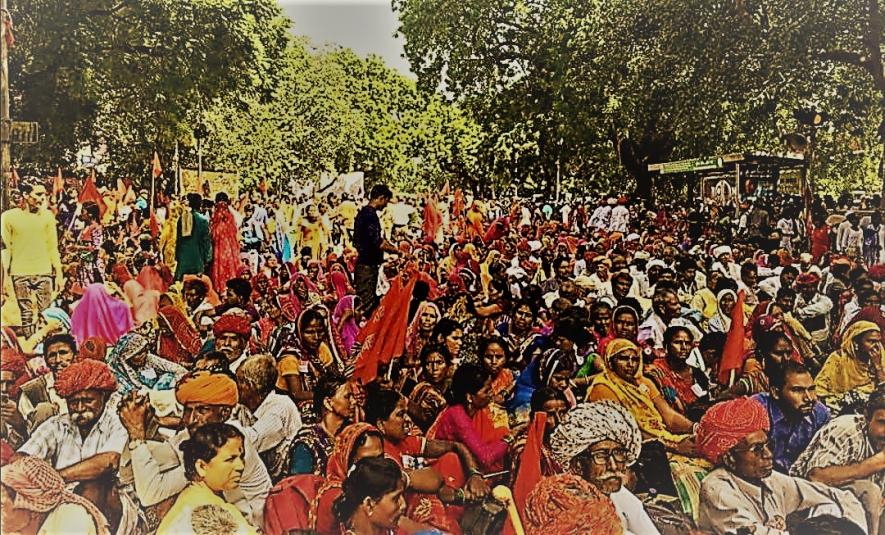
Holding a picture of her deceased son in one hand and wiping her tears with another, 71-year-old Sakhubai, explains the perils of being an old, single woman. “There is no one to look after me, and I have no funds. With no option in sight, I came here with hope,” she said. Over 3,000 women and men, aged between 60 and 80 years marched across the streets of Delhi, on September 30, to bring their plight to the fore.
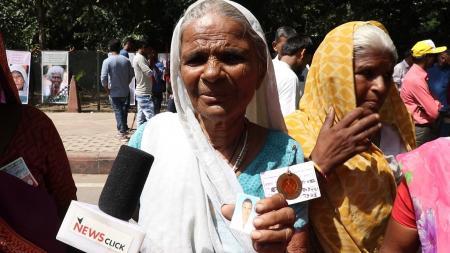
Showing his wounds, Satyapal said, “Old age brings its own set of troubles, but having to beg for my right is not what I thought I would have to end up doing.” He recently got a heart surgery done, wounds of which are still fresh. However, as he did not receive his pension, he did not have money to buy medicines so that he could recover.
Speaking to Newsclick, an elderly man said, “We are demanding our rights, not pity from the state.”
According to the State of Pension Report, 2018, over 58 million Indian elderly are still denied the benefits of pension. Unveiling the report on September 28, Mathew Cherian, Chief Executive, Helpage, India, had stated: “Of the 80 million elderly entitled to pension of Rs. 200 per month, this meager amount by the central government reaches just 22.3 million people, as per the NSAP dashboard, leaving out 58 million people with no pension or any other form of assistance.” In other words, less than one-third of the elderly in India are covered under the old age social pension schemes and less than eight per cent of the elderly in India are being employed in the formal job-sector and are securing pension. The plight of 93 per cent people employed in unorganised sector – bereft of any social security – is grossly unjust to say the least, as they have contributed a large part to the country’s GDP, he added.
Devendra Prasad Mandal, an elderly from Bihar, explained, “We are paid pittance. How can one even sustain on Rs 200? Sometimes, even that money is delayed. There have been so many times when we have not had anything to eat.”
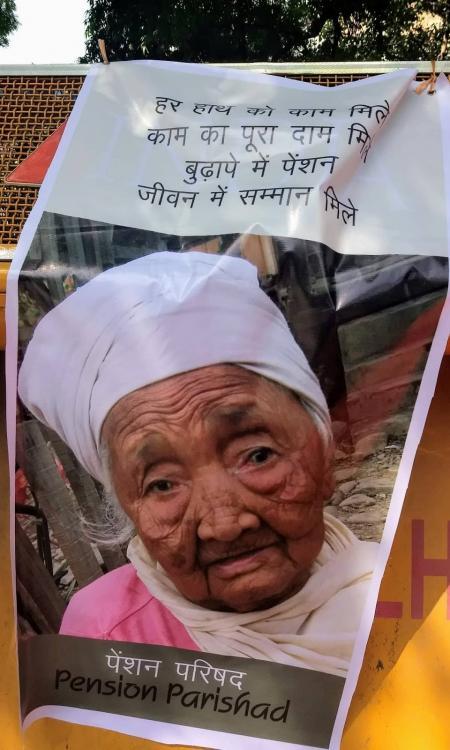
The central government, under the National Social Assistance Programme (NSAP), provides a measly contribution of Rs 200 per month. Many states do not add a matching contribution. At present, old age beneficiaries get between Rs 200 and Rs. 2000, depending on the state they belong to. The amount of Rs 200 has remained unchanged since 2006-07; even the elementary courtesy of indexing it to inflation has not been accorded to the elderly. According to many beneficiaries, this pension too can often be delayed for up to two years, as was observed in Bihar last year. In 2016, in Rajasthan, some pensioners were repeatedly denied pensions due to the issue of linkage of the scheme with the Aadhaar, according to reports. In some shocking cases, beneficiaries were reportedly declared dead because of technical errors.
Shankar Singh, a member of the Pension Parishad from Rajasthan, recalled one such harrowing account when a woman from Devgarh, in her late 80s, was allegedly denied pension. She could also not authenticate herself, and died of hunger and starvation, according to Singh. He added, “What is worse is the attempts made by the state to prove that she did have food her in house, to evade responsibility.”
Activist Aruna Roy, associated with the movement, said, “They (the government) wants to build toilets, but people don't have any food in their belly. What do they need the toilets for?”
Commenting on the state of affairs, economist Prabhat Patnaik said, “This is truly a scandalous state of affairs, not just because the sum is laughably paltry, but the beneficiary list is absurdly truncated, and even elementary protection against inflation is missing.” Emphasising that adequate pension to the elderly is an economic right, Patnaik opined that it must be universal, enjoyed by all, and cannot be either contributory or means-related.
Worst hit in this scenario remain the unorganised workers. According to a paper published by JNU professors Praveen Jha and Nilachala Arya in 2013, 93 per cent of the workforce in India falls under the unorganised sector. Majority of them are not covered under any pension scheme. Pensions for the unorganised sector employees today are far from anything akin to a universal entitlement. Each person has to apply, and the onus is on them to prove their eligibility. While the emphasis on digitisation – using tech solutions with updated centralised databases – is increasing, critics of these policies claim that these are clearly being used by the state for their own convenience.
Asserting that adequate pension is an economic right, the elderly demanded that the monthly entitlement should be equivalent to half of the minimum wage, which comes to about Rs 2,500. This amount should be revised twice a year to account for inflation. Patnaik added, “There is a straightforward solution to this problem. If India spends even a meagre 2 per cent of its current GDP, this problem can be solved, it is only a question of priorities and how social security is viewed in the society.”
Lalit Mathur, a former IAS officer, told Newsclick, “The elderly in the country have not made any progress; there is lack of acceptance on the part of the government. The issue needs to be taken up by the government as one of its own responsibilities, not one that is dependent on fiscal possibility. Even if we see Nepal, which may be a smaller economy, but it still has a universal cover for the elderly.”
Syeda Hameed, an activist associated with the movement, said, “Hum sab buzurgi ki raah par hain, ye masla sabka masla hai. (We all are on our way to the old age; this issue is everyone’s issue.)” Currently, the protesting elderly have made appeals to the BJP government to give them their due. Slogans such as ‘Ambani ne mauj manai, Modi tere raj main, companies ne khoob kamai, Modi tere raj main (Oh Modi, Ambani has enjoyed in your rule; oh Modi, companies have filled their pockets in your rule!)’ were raised during the protest.
Get the latest reports & analysis with people's perspective on Protests, movements & deep analytical videos, discussions of the current affairs in your Telegram app. Subscribe to NewsClick's Telegram channel & get Real-Time updates on stories, as they get published on our website.











